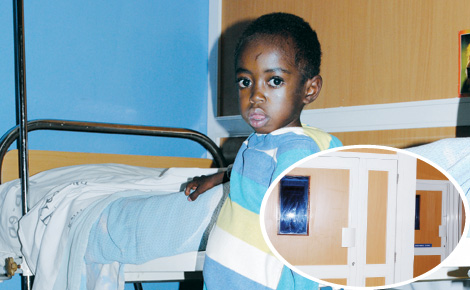×
The Standard e-Paper
Fearless, Trusted News
 |
|
Winnie Wangechi, 6, is a patient at Kenyatta National Hospital where she has been for four months. INSET: Firmly locked doors of the isolation ward. The ward has no ventilation. [PHOTOS: GEORGE NJUNGE/STANDARD] |
By RAWLINGS OTIENO
NAIROBI, KENYA: For four months now, six-year-old Winnie Wangeci has lived alone in a secluded ward at the Kenyatta National Hospital. She is going to live in this ward for five more months because she has to finish a nine-month treatment regime for a deadly strain of tuberculosis known as Multi-Drug Resistant Tuberculosis (MDR-TB).